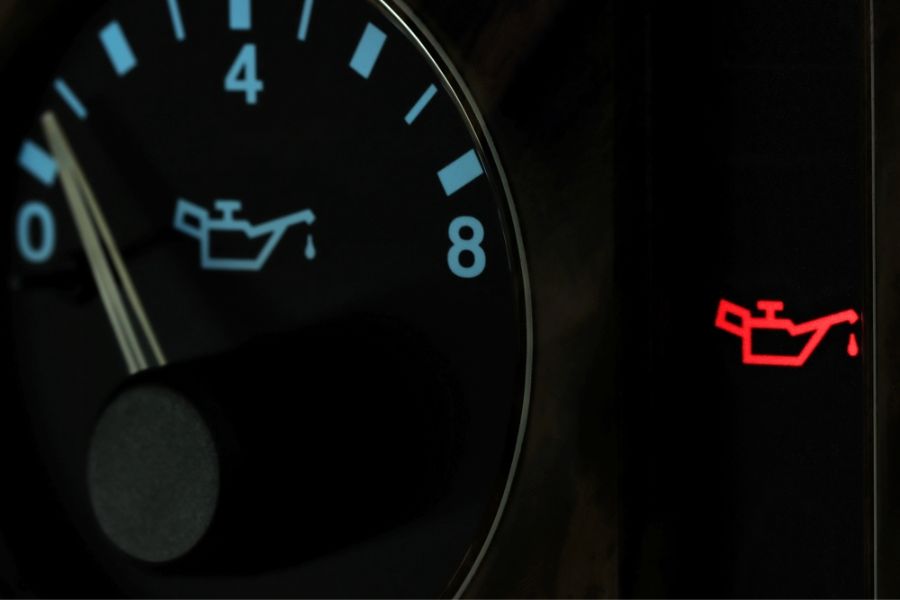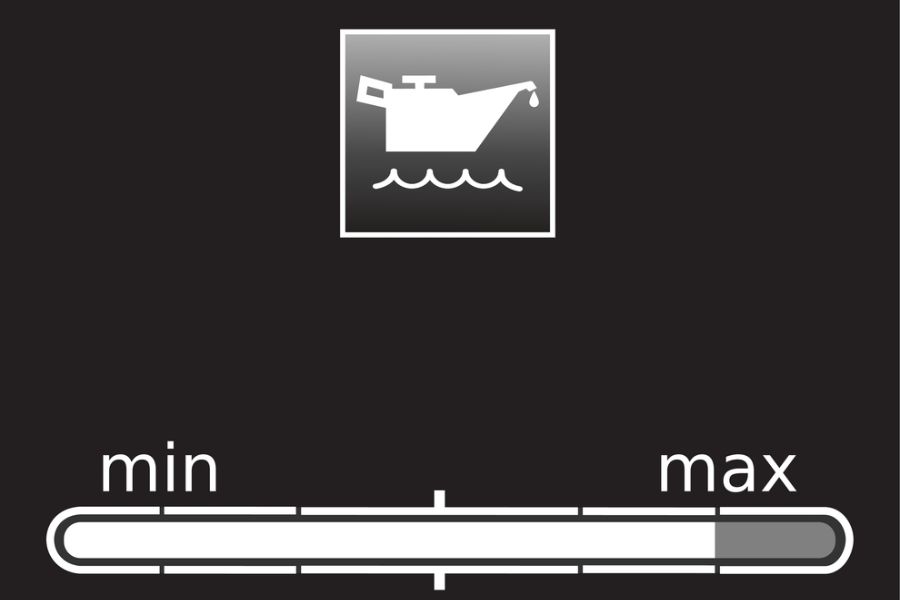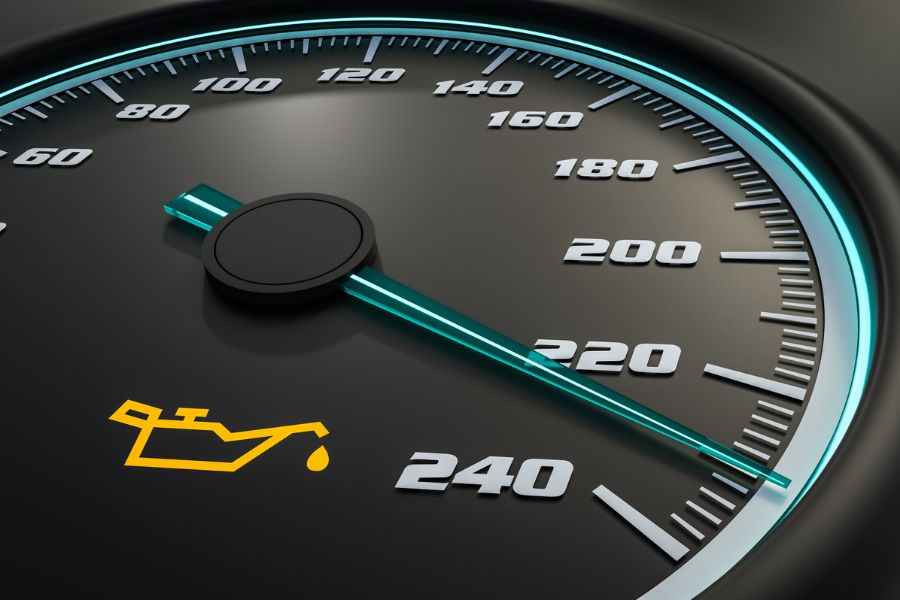Picture yourself driving and having fun. The dashboard’s low oil pressure indicator flashes, frightening you. Big deal!
This light functions as your car’s heart. Warning: engine requires maintenance. Why is it vital and how does it keep your automobile operating smoothly?
If you disregard this light, things might go awry. Important for your car’s health. So pay attention to it!
Understanding Oil Pressure
Discuss oil pressure. Like your car’s blood pressure, it’s vital to its health.

What is Oil Pressure?
In techy terms, car oil pressure is how hard it works in the engine. Engine pumps oil as heart pumps blood. This prevents overheating and rubbing.
In simple words, consider oil pressure your car’s heartbeat. It regulates oil flow. Problems include high or low blood pressure.
Why Does Oil Pressure Matter?
Engines operate smoothly with good oil pressure. Oil circulates about, minimizing friction and overheating. Vital to your car’s health.
Low oil pressure is bad. It means oil can’t reach important parts. This heats and damages. It can cause expensive repairs in the worst instance. So watch it!
What Makes Your Car Have Low Oil Pressure When Idle?
You may have low oil pressure when your car is still. The low oil pressure indicator comes on when the oil pump stalls.
Common Causes of Low Oil Pressure
Many causes might cause this when your car is idling. Oil or part concerns may be involved. Check out what may affect your car’s oil pressure.
- Tired Oil Pump: A worn-out oil pump can’t pump effectively, lowering oil pressure, especially when idle.
- Not Enough Oil: Too little oil can cause a drop in oil pressure. Keep your oil level right.
- Dirty or Old Oil: Old or dirty oil gets thin, lowering pressure. Regular oil changes are key.
- Worn Out Engine: As engines wear, they may leak oil, reducing pressure. Regular check-ups help.
- Bad Oil Pressure Sensor: Sometimes, it’s just a faulty sensor. Check the sensor if you get a low oil pressure warning.
You now understand why your car’s idle oil pressure is low. Knowing these can help you maintain the car and avoid that warning light.
Can an Oil Filter Cause Low Oil Pressure at Idle?
Your car’s oil pressure depends on oil filters. Oil is cleaned to keep engines running smoothly. Bad oil filters might lower oil pressure when your automobile is idling.

The Oil Filter’s Role in Oil Pressure
Oil flows smoothly because the filter eliminates contaminants. This keeps oil pressure appropriate, especially when the automobile is operating.
Bad oil filters allow contaminants to accumulate. This thickens and slows oil, lowering idle pressure.
How a Faulty Oil Filter Affects Oil Pressure at Idle
A bad oil filter reduces engine performance and noise. You may witness a low oil pressure light or leak.
Oil flow is limited by blocked filters. Idle engines make this worse. Slow oil flow lowers pressure, prompting the warning light.
A malfunctioning oil filter might produce idling low oil pressure. Maintaining it keeps your automobile operating smoothly.
What is the Perfect Oil Pressure Level at Idle
Normal oil pressure range
When your car idles, its oil pressure is usually between 10 to 20 psi. This level is just right.
Why this range matters: Just like Goldilocks’ porridge, the pressure needs to be not too high, not too low. High pressure can stress out your oil pump and seals. Low pressure means not enough lube for the engine, wearing it out faster.

Factors That Affect Oil Pressure
What changes oil pressure? Several things can impact it:
- Your oil’s type and thickness
- Your oil pump’s condition
- Engine temperature
- Oil filter’s status
- Overall engine health
How these factors play a role: Different oils alter engine movement. Thicker oil increases pressure, thinner oil decreases it. A malfunctioning oil pump or blocked filter might lower pressure. Oil pressure drops with hot engines. Old engines can lower pressure.
Maintenance oil pressure is like juggling. You know what to check for to maintain your automobile!
Synthetic Oil: Does It Affect Oil Pressure?
The Lowdown on Synthetic Oil
What’s Synthetic Oil? The wiser relative of normal oil is synthetic. It contains unique ingredients not present in crude oil. This makes it smoother and more efficient than conventional oil.
The Pros and Cons of Synthetic Oil: Synthetic oil is durable. It works well in intense heat or cold. However, it’s more expensive and may not suit older automobiles using conventional oil.
Can Synthetic Oil Lower Oil Pressure?
Common Beliefs Because synthetic oil is thinner and flows better, some say it lowers oil pressure.
The Truth: Although synthetic oil flows nicely, it doesn’t lessen oil pressure. Pressure relies on oil flow resistance. Synthetic oil won’t reduce pressure if your car’s oil pathways are clear and the pump functions. Its smo
Thus, synthetic oil doesn’t lower oil pressure. Low oil pressure may indicate engine concerns like damaged bearings or a plugged oil flow. If low oil pressure worries you, visit a professional.
How to Increase Oil Pressure at Idle
Keeping your engine healthy requires proper oil pressure. Increase idle oil pressure using these procedures. If you’re unsure about DIY, consult a specialist.
Step-by-Step Guide to Increase Oil Pressure
- Check Oil Level: Pressure might drop with low oil. Adding oil may help.
- Change the Oil Filter: A faulty filter lowers pressure. Changing it balances pressure.
- Use Correct Oil Grade: The correct oil quality matters. A bad one might thin and reduce pressure.
Effectiveness of Each Step
Oil level control is easy and effective for pressure. Free oil flow and pressure need replacing a faulty filter. Finally, use the proper oil quality for your automobile to minimize pressure decreases.
Tips and Precautions for Oil Pressure
- Quality Matters: Choose good oil and filters. This helps prevent low pressure and saves future costs.
- Be Careful: Overpressure damages engines. Consult your car’s handbook. See a mechanic if the low pressure light continues on.
Low idle oil pressure is dangerous. This article should help you maintain your engine. Remember, prevention is better than cure.
Is 40 psi Oil Pressure Good at Idle?
Oil pressure is essential for engine performance. When your car idles, is 40 psi good?
Think of 40 psi as 40 pounds pressing on every engine square inch like air in a balloon. Running engines like 25–65 psi. Pressure drops during idling.
Car make and age determine if 40 psi is safe. Some automobiles tolerate low pressure. Others require more. Older automobiles inherently have less pressure. A quick decline in a new automobile may be an issue.
If your car runs smoothly and has no warning lights, 40 psi at idling may be sufficient. Call a mechanic if you see the oil light or sense something’s odd. Keep your automobile healthy by monitoring oil pressure. While 40 psi may be ideal for your automobile, check for indicators and respond if something appears incorrect.
Conclusion
Oil pressure is crucial for a car’s smooth operation and is often affected by the oil filter. Synthetic oil may lower oil pressure, but it’s not true.
Tips on boosting oil pressure are provided. It’s important to keep an eye on oil pressure, as every car’s well-being depends on it. If you notice anything off, don’t hesitate to address it.
